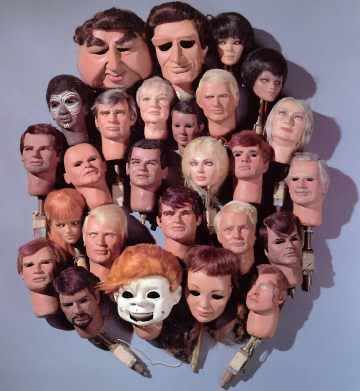
“Weddings are the most superstitious of holidays. And the cake? Well it’s like any marriage, right? I won’t say the cake is human, but the cake is something special.” —Mary, a former Grace Pastries customer
Talk to anyone who grew up in the Crenshaw district of southwestern Los Angeles and they'll tell you how they remember the sweet aroma that once spilled from the doors of Grace Pastries. At Grace Pastries, the cake was king; a symbolic reward that came as a result of the Japanese American communities' hard-earned post-war successes. For every wedding, every graduation, every grand opening or anniversary, and especially when a child's birthday was celebrated, there was a specialty cake from Grace; a bed of pastel roses, scalloped buttercream borders, a riot of plastic palm trees or circus clowns. These were edible trophies for a community finally rising from the harsh realities of World War II, and for a time, it almost seemed that the bakery couldn't be able to keep up with all of the demands.
The original store was a tiny retail space, only 50 feet deep, but the walls were neatly papered and the glass cases nearly burst with a dizzying array of buttery confections. The staff were always neatly coiffed and dressed in starched uniforms, ready to greet customers from the moment doors opened. As the customer base swelled expotentially, Izumi expanded to a larger location six blocks away on Jefferson and Crenshaw, right where the J Yellow Car line ended. Within a decade, Grace Pastries had the highest name recognition of any bakery in Los Angeles, and eventually boasted fourteen outlets throughout the greater Los Angeles county. Among his devoted customers was Marian Manaka, who remembers fondly; "My sister and I lived together right there on Jefferson Boulevard and used to take our two kids in a stroller past all the shops on our way to Grace, where we always got a treat. The dobash cake and oh, the teacakes!" These rapturous recollections are especially common amongst the Nisei and young Sansei, who describe a trip to Grace as "the ultimate good," for a generation craving sweet memories that lingered.

The founder, George Izumi, is a Nisei— born in Hollywood in 1921 and raised on farms where his father Riyozo raised commercial flowers and vegetables, as the majority of Issei at that time did. He was one of eight kids, which taught him to be fiercely independent and some of his earliest chores was learning to harnass the horse to the wagon and spread manure on the fields. It was a hard time in America, and daily meals for a family of ten, let alone a powdered donut, were meager or non-existent. "In Santa Monica there used to be a city dump where someone would throw all their walnut shells out, and us kids, we'd pick through the shells and eat what we could find. Dad would go fishing and bring back whole sacks of bonita and mackarel, which we'd cook with shoyu and sato, turning it all into gelatin and pour over hot rice with cooked beet leaves. I'm also pretty sure my mom would pickle all of the fish guts,." Growing up in the 30s also meant picking up a sack of day olds from Wonder Bread that turned nice and soft in the steamer and eaten with oleo or lard if the kids were that lucky.
Izumi was eighteen when war broke out. The family was sent to Manzanar, where he first worked as a carpenter, but really what he wanted to learn was how to cook. He got a job in Mess Hall #16, which required getting up at three a.m. to fire up the oil stoves. But learning from the Issei men in the kitchen provided to be slippery:"the Issei just said, a piece of that, a scoop of that- it still tasted good- but they sure couldn't tell you how to make it." In the end, he claims he didn't learn much, since all he did was cut out biscuits. And he recalls that the mutton stew sure used to stink.
When the Nisei draft was re-enacted, George enlisted from camp, fully prepared to train for combat. Once the Army learned of his cooking experience, they sent him to the Cooks and Baker's School at Ft. Meade, Maryland instead. "Learning to bake? Its not that hard. Its all written out step by step, you got it made. Just like the Army- you follow directions." At the end of the war, he found work in Chicago flipping English muffins on a grill, and gaining more bread, cake, and cupcake experience before he earned enough to return to California in 1946.
George and Grace Izumi (nee Kato) began courting in 1948 and were married in 1949 at Nishi Hongwanji Temple in Little Tokyo. The young couple founded Grace Pastry Shoppe on March 13, 1950, six months after the wedding, on a $3,500 loan from Grace's parents. They acquired second hand equipment and cleaned and painted the place, pulling 18 hour workdays. On opening day, they took in $25 and the next day $30, and called it lucky if they made $100 a week. They even made wedding cake deliveries in their 1942 Pontiac, with Grace in the backseat, holding onto the cake for dear life. She eventually retired from the bakery and dedicated her time to raising their four children, all with auspicious "G" names: Grayson, Glenda, Garret, and Genelle. Grace revealed that even the pets had "G" names, so that they wouldn't feel left out: Gabby the Mynah bird, cats Gussie, Gigi and Ginny, the dog Gibo, and of course the fish were all Guppies.
According to Izumi, what really saved the bakery from mediocrity and turned it into a real enterprise was knowing the value of improving any product. "You have to have determination to make it better, " says Izumi, and for 39 years he perservered and like the rest of the JA community, made things better than before. Meanwhile, his reputation as a master baker grew.


He was the only baker in the National Association of Retail Bakers to have won Gold Cup awards in all fourteen categories, and while most assume that the popular layered Dobash cake is an invention from Hawai'I, it was in fact George Izumi who created it first and brought it to the islands during baking demonstrations. "I made a traditional Dobos torte, which caught on with some Issei ladies, and with their Japanese accent, they asked for that "Doba-shi" because they couldn't pronounce the Hungarian word."
Ultimately, those intimate stories connecting the strawberry pie, the coffee danishes, or a cream pastry with so many personal memories, combined with Izumi's community work has left a lasting impression. Leftover baked goods went to Maryknoll school, he gave to Centenary and Senshin church, donated a cake annually to Nisei Week and dozens of city celebrations and events, and was an active fundraiser for Yellow Brotherhood. He also credits the sweat and tears of his staff, Richard Kojima, general manager; Tak Teramae, office manager; Bob Wright and Emma Englund, cake deorators; Peggy Nishima,; Toggie Nakamoto; all of the Sansei girls who got after-school jobs working behind the counter; Kaz Furuto, the original bookkeeper, who would bring Grace and George dinner so that they could keep pushing into the night.

Grace Pastries was sold in 1989 and George Izumi doesn't complain. Taking into account the whole of his story, an American life filled with contradictions; the life of a baker whose toughness and business acumen brought a touch of salt along with the sweet, you see the essential ingredient to everything he did. "How do I make the tea cakes? Simple cake. You have to know what you're doing, that's all."



8 comments:
This is really a nice article about pastry. Pastry is used in every wedding, anniversary, and especially when a child's birthday was celebrated. Nice post. Thanks for sharing.
Beverly Karshner
Hi there, just in case the email I sent to you yesterday went to your spam folder, you are one of the winners of the Shakespeare books that have laser cut images. Please email me.
Terrific article on Grace Pastries and George Izuma. I had my wedding cake make from the tea cake recipe in the 70s. It wasn't the type of cake texture used for wedding cakes but I loved the tea cake so much, I had to have it. It came out perfect! Aki's bakery in San Jose sells the tea cake still (even after the shop got sold).
Terrific article on Grace Pastries and George Izuma. I had my wedding cake make from the tea cake recipe in the 70s. It wasn't the type of cake texture used for wedding cakes but I loved the tea cake so much, I had to have it. It came out perfect! Aki's bakery in San Jose sells the tea cake still (even after the shop got sold).
Growing up, every birthday cake I had until I was 25 years old was made by Graces Pasteries!
My first Birthday Cake was from Grace Pastries. I can still remember those printed boxes in red and blue prints with balloons all over. I was 2 years old and I will never forget the taste of a birthday cake. That frosting has often been imitated but never duplicated. I miss this place!
Just out if High School I remember Grace Pastries in Inglewood On Market Am I correct.
Wow!
Amazing!!!
I started on a journey trying to remember the name of this bakery. I spent 4 hours in November 2019 looking for the name, google search upon search - no luck. I didn't think about it again until this evening, New Year day 2020. I started searching again, no luck...
I remember my grandmother taking me to a bakery and buying these great tasting cakes with the best icing on top. I remembered the ballons but I didn't remember the colors. Searched after search - no luck.
I texted my mom because I remembered her wedding cake and my auntie & uncle wedding cake were from this bakery. My mom didn't remember the name of the bakery either. I couldn't let this rest. I finally remembered the name of the bakery began with a "G". Searched upon searched and there it was - Grace Pastries.
I was so happy to find the name of the bakery and read the stories. This is a very personal story because I too have so many great memories of Grace Pastries with my grandmother who died 8 years ago. These special memories never go away. Places like Grace Pastries touch the core of our soul, like Disneyland.
I learned a lot this evening about the founder that I never knew and it's so gratifying to know that HARD work was at the core of his success!
I'm 58 years old. I have a bakery now and I too believe in hard work, a niche and a point of differentiation. It's paying off. I know I'm on the right track when we touch the core of our customer's soul.
That's what is all about. Providing a great memorable experience that puts a smile on their face and keep them coming back!
Post a Comment